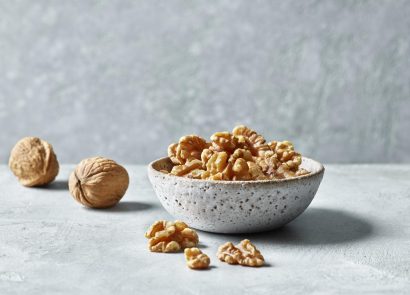When it comes to our health, keeping our ticker in good nick isn’t something we’re too conscious of – a lot of us probably take it for granted. But, with the British Heart Foundation suggesting that heart disease in women is twice as deadly as breast cancer, should we be taking better care of our hearts? Claire Munnings investigates…
Include more omega three in your diet
Looking at the food you eat is one of the easiest ways to make long-lasting improvements to your health, and introducing more omega 3s into your diet has multiple benefits for your wellbeing. “Omega 3 is great for maintaining a healthy heart by helping reduce blood pressure, cutting the risk of blood clotting and also decreasing the likelihood of strokes and heart failure,” explains Dr Josh Cullimore, GP at Bluecrest Health Screening. “Omega 3s can be found in flaxseed, rapeseed oil, chia seeds, walnuts, fish and algae oils and capsules.”
Add some turmeric to your day
This wonder spice has been in the spotlight in recent years – and for good reason. Studies have found that it can relieve pain and swelling caused by arthritis and experts suggest it can help with a range of conditions, including Alzheimer’s disease and pre-menstrual tension. And research also indicates that turmeric could help reverse steps in the heart disease process by reducing inflammation and oxidation damage. “Turmeric contains many wonderful compounds, including curcumin, that have an anti-inflammatory effect by blocking pro-inflammatory enzymes,” explains nutritionist Henrietta Norton, who’s the founder of food-grown supplements brand Wild Nutrition (wildnutrition.com). “Turmeric also relieves oxidative damage. Other antioxidant-rich foods which can help protect the heart include berries, artichokes, dark leafy greens, green tea, figs, apples and oily fish.”
Look after your teeth and mouth
You might not naturally associate your oral hygiene routine with the health of your heart but research shows it is vitally important. “Poor dental hygiene increases the risk of bacterial infections to the bloodstream, which can result in damage to the heart and valves,” explains Dr Josh. “The American Heart Association has also found that stroke and atherosclerosis (clogged arteries) can be linked back to inflammations caused by oral bacteria. By improving your oral hygiene and regularly visiting a dentist, you can reduce the risk of developing heart-related diseases.” Time to book that overdue appointment?
Boost your magnesium levels
As Henrietta explains, magnesium helps to support healthy blood pressure – something which is key for maintaining your heart. “As high blood pressure is a significant risk factor for heart disease, adding more magnesium-rich foods and a magnesium supplement could be very beneficial. Good sources of this mineral include leafy greens, such as spinach and kale, pumpkin seeds, almonds, avocado, kefir and dark chocolate that’s at least 85 percent cacao.”
Get a good night’s sleep
We all know sleep can make a huge difference to our wellbeing, and yet many of us don’t prioritise it in the same way we do other healthy habits. “Those who don’t get enough sleep increase their risk of developing cardiovascular disease and coronary heart disease,” warns Dr Josh. Research backs this up too – one study found that adults who slept for less than six hours a night had a 48 percent greater chance of developing heart disease and a 15 percent greater chance of having a stroke. It’s recommended that adults get seven to nine hours of sleep each night, but we know this can be tough – especially if you have young children. Get into the habit of going to bed half an hour earlier by turning off the TV at a specific time each night and try to resist checking your phone once you get into bed – the bright lights can disrupt your internal body clock and tell your brain it’s not time for sleep.
Eat more protein
One of the biggest risk factors for heart disease is extra weight – so doing what you can to reduce weight gain and sugar cravings seems sensible. “A great way to do this is to eat more protein,” says Henrietta. “Make sure all your meals include protein and healthy fats, as these food groups take much longer to break down in the stomach and provide a slow and steady source of energy, reducing the need to snack. Foods like avocado, hemp, chia, flax seed, nuts and seeds, eggs, wild-caught fish, pasture-raised beef, free-range chicken and turkey and beans and pulses, such as aduki beans, mung beans, lentils and chickpeas are all good sources of protein,” she adds.
Try peripheral heart action training
This phrase may not roll easily off your tongue but the exercise technique is a good one to know – as it can help strengthen your ticker. “Peripheral heart action training is a form of resistance training that incorporates an aerobic or cardiovascular effect on the body by working alternating body parts one after the other with little or no rest,” explains Darren Doak, a personal trainer and field manager at The Training Room (thetrainingroom.com). In other words, you do one exercise that works your upper body followed immediately by another that works your lower body. This makes your heart work harder and keeps your blood circulating throughout your whole body, and might include something like squats followed directly by tricep dips. “This is great for people who don’t like, or are unable to do, long aerobic sessions such as running or cycling,” Darren adds.
Get your homocysteine levels checked
“Homocysteine is an amino acid in our body that must be kept within a healthy range,” explains Henrietta. “Risks associated with high homocysteine include coronary artery disease, heart attack, stroke and deep vein thrombosis, and your levels can be measured with a simple blood test.” If you’re worried about your levels, you can talk to your GP about getting tested – or you can also opt to pay privately for an at-home test kit, such as the ones offered by York Test Laboratories (yorktest.com). “Folate, B6 and B12 deficiencies are associated with high homocysteine levels so ensure you’re eating foods that contain these vitamins as part of a healthy balanced diet,” Henrietta adds.



















